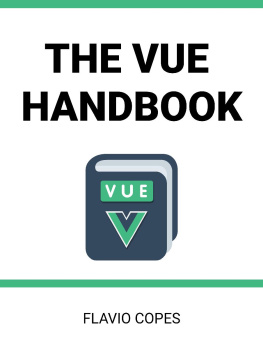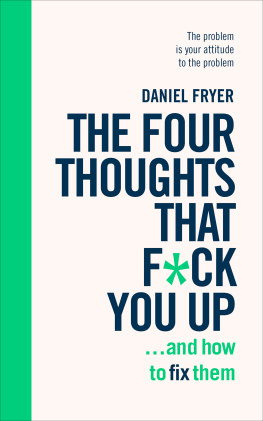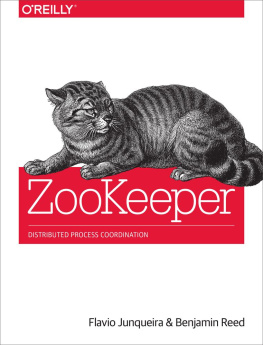Flavio Copes - The Vue Handbook
Here you can read online Flavio Copes - The Vue Handbook full text of the book (entire story) in english for free. Download pdf and epub, get meaning, cover and reviews about this ebook. year: 2018, genre: Computer. Description of the work, (preface) as well as reviews are available. Best literature library LitArk.com created for fans of good reading and offers a wide selection of genres:
Romance novel
Science fiction
Adventure
Detective
Science
History
Home and family
Prose
Art
Politics
Computer
Non-fiction
Religion
Business
Children
Humor
Choose a favorite category and find really read worthwhile books. Enjoy immersion in the world of imagination, feel the emotions of the characters or learn something new for yourself, make an fascinating discovery.
- Book:The Vue Handbook
- Author:
- Genre:
- Year:2018
- Rating:5 / 5
- Favourites:Add to favourites
- Your mark:
- 100
- 1
- 2
- 3
- 4
- 5
The Vue Handbook: summary, description and annotation
We offer to read an annotation, description, summary or preface (depends on what the author of the book "The Vue Handbook" wrote himself). If you haven't found the necessary information about the book — write in the comments, we will try to find it.
The Vue Handbook — read online for free the complete book (whole text) full work
Below is the text of the book, divided by pages. System saving the place of the last page read, allows you to conveniently read the book "The Vue Handbook" online for free, without having to search again every time where you left off. Put a bookmark, and you can go to the page where you finished reading at any time.
Font size:
Interval:
Bookmark:
- Intro to Vue
- Tooling
- Components
- Components building blocks
- Communication, state management and routing
Thank you for getting this ebook!
My name is Flavio and I run a blog at flaviocopes.com, where I write a tutorial every day.
You can find me on Twitter at @flaviocopes
At the end of July 2018, I will launch an online course on Vue.js with practical tutorials and direct mentorship from me.
Find out more at vuecourse.com!
Happy learning!
Vue is a very popular JavaScript frontend framework, one that's experiencing a huge growth.
It is simple, tiny (~24KB) and very performant. It feels different from all the other JavaScript frontend frameworks and view libraries. Let's find out why.
If you're unsure what a JavaScript framework is, Vue is the perfect first encounter with one.
A JavaScript framework helps us to create modern applications. Modern JavaScript applications are mostly used on the Web, but also power a lot of Desktop and Mobile applications.
Until the early 2000s, browsers didn't have the capabilities they have now. They were a lot less powerful, and building complex applications inside them was not feasible performance-wise, and the tooling was not even something that people thought about.
Everything changed when Google unveiled Google Maps and GMail, two applications that ran inside the browser. Ajax made asynchronous network requests possible, and over time developers started building on top of the Web platform, while engineers worked on the platform itself: browsers, the Web standards, the browser APIs, and the JavaScript language.
Libraries like jQuery and Mootools were the first big projects that built upon JavaScript and were hugely popular for a while. They basically provided a nicer API to interact with the browser and provided workarounds for bugs and inconsistencies among the various browsers.
Frameworks like Backbone, Ember, Knockout, AngularJS were the first wave of modern JavaScript frameworks. The second wave, which is the current one, has React, Angular, and Vue as its main actors.
Note that jQuery, Ember and the other projects I mentioned are still being heavily used, actively maintained, and millions of websites rely on them. That said, techniques and tools evolve, and as a JavaScript developer, you're now likely to be required to know React, Angular or Vue rather than those older frameworks.
Frameworks abstract the interaction with the browser and the DOM. Instead of manipulating elements by referencing them in the DOM, we declaratively define and interact with them, at a higher level.
Using a framework is like using the C programming language instead of using the Assembly language to write system programs. It's like using a computer to write a document instead of using a typewriter. It's like having a self-driving car instead of driving the car yourself.
Well, not that far, but you get the idea. Instead of using low-level APIs offered by the browser to manipulate elements, and build hugely complex systems to write an application, you use tools built by very smart people that make our life easier.
How much popular is Vue.js?
Vue had:
- 7600 stars on GitHub in 2016
- 36700 stars on GitHub in 2017
and it has more than 100.000+ stars on GitHub, as of June 2018.
Its npm download count is growing every day, and now it's at ~350.000 downloads per week.
I would say Vue is a lot popular, given those numbers.
In relative terms, it has approximately the same numbers of GitHub stars of React, which was born years before.
Numbers are not everything, of course. The impression I have of Vue is that developers love it.
A key point in time of the rise of Vue has been the adoption in the Laravel ecosystem, a hugely popular PHP web application framework, but since then it has widespread among many other development communities.
First, Vue is called a progressive framework.
This means that it adapts to the needs of the developer. While other frameworks require a complete buy-in from a developer or team and often want you to rewrite an existing application because they require some specific set of conventions, Vue happily lands inside your app with a simple script tag, to start with, and it can grow along with your needs, spreading from 3 lines to managing your entire view layer.
You don't need to know about webpack, Babel, npm or anything to get started with Vue, but when you're ready Vue makes it simple for you to rely on them.
This is one great selling point, especially in the current ecosystem of JavaScript frontend frameworks and libraries that tends to alienate newcomers and also experienced developers that feel lost in the ocean of possibilities and choices.
Vue.js is probably the more approachable frontend framework around. Some people call Vue the new jQuery, because it easily gets in the application via a script tag, and gradually gains space from there. Think of it as a compliment, since jQuery dominated the Web in the past few years, and it still does its job on a huge number of sites.
Vue picks from the best ideas. It was built by picking the best ideas of frameworks like Angular, React and Knockout, and by cherry-picking the best choices those frameworks made, and excluding some less brilliant ones, it kind of started as a "best-of" set and grew from there.
The 2 elephants in the room, when talking about web development, are React and Angular. How does Vue position itself relative to those 2 big and popular frameworks?
Vue was created by Evan You when he was working at Google on AngularJS (Angular 1.0) apps and was born out of a need to create more performant applications. Vue picked some of the Angular templating syntax, but removed the opinionated, complex stack that Angular required, and made it very performant.
The new Angular (Angular 2.0) also solved many of the AngularJS issues, but in very different ways, and requires a buy-in to TypeScript which not all developers enjoy using (or want to learn).
What about React? Vue took many good ideas from React, most importantly the Virtual DOM. But Vue implements it with some sort of automatic dependency management, which tracks which components are affected by a change of the state so that only those components are re-rendered when that state property changes. In React on the other hand when a part of the state that affects a component changes, the component will be re-rendered and by default all its children will be rerendered as well. To avoid this you need to use the shouldComponentUpdate method of each component and determine if that component should be rerendered. This gives Vue a bit of advantage in terms of ease of use, and out of the box performance gains.
One big difference with React is JSX. While you can technically use JSX in Vue, it's not a popular approach and instead the templating system is used. Any HTML file is a valid Vue template, while JSX is very different than HTML and has a learning curve for people in the team that might only need to work with the HTML part of your app, like designers. Vue templates are a lot similar to Mustache and Handlebars (although they differ in terms of flexibility) and as such, they are more familiar to developers that already used frameworks like Angular and Ember.
Font size:
Interval:
Bookmark:
Similar books «The Vue Handbook»
Look at similar books to The Vue Handbook. We have selected literature similar in name and meaning in the hope of providing readers with more options to find new, interesting, not yet read works.
Discussion, reviews of the book The Vue Handbook and just readers' own opinions. Leave your comments, write what you think about the work, its meaning or the main characters. Specify what exactly you liked and what you didn't like, and why you think so.












